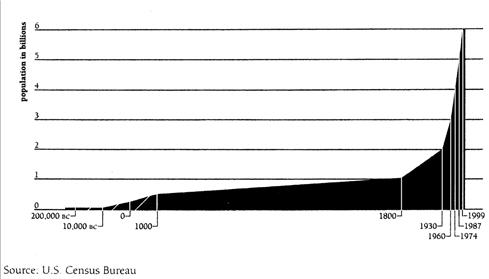
"
The bottom line is that the world is in what ecologists call an "overshoot-and-collapse" mode. Demand has exceeded the sustainable yield of natural systems at the local level countless times in the past. Now, for the first time, it is doing so at the global level. Forests are shrinking for the world as a whole. Fishery collapses are widespread. Grasslands are deteriorating on every continent. Water tables are falling in many countries. Carbon dioxide (CO2) emissions exceed CO2 sequestration everywhere."
--Lester Brown, Plan B 2.0: Rescuing a Planet Under Stress and a Civilization in Trouble
[Author's Note: This is the first part in a series based upon excerpts from the brand-new edition of When Technology Fails: A Manual for Self-Reliance, Sustainability and Surviving the Long Emergency] The eco-threat tops my list of threats to our civilization, and here's why: The natural systems that have supported life on our planet for millennia are showing signs of severe stress and approaching collapse. In the short-term, people located in the Western world already fare the current climate changes much better than those in the third world, but if this planet goes down, it won't matter much if you are the "first world" or the "third world." Biosphere 2, a 3.5-acre sealed enclosure in Oracle, Arizona, was designed and built to be a fully self-contained, human-made, self-supporting ecosystem. The eight inhabitants, who were sealed into its structure from September 1991 until September 1993, all complained of inadequate food supply (they were always hungry), and the sealed indoor atmosphere steadily degraded until the experiment was stopped for safety reasons. If a top-notch engineering team with funding of more than $100 million can't create a self-contained, self-supporting ecosystem for only eight people on the surface of our own planet without the additional problems posed by a hostile environment such as outer space, we had better realize that good planets are hard to find and that we must start taking care of this one before it is too late. This experiment made it perfectly clear that no matter how technologically advanced we may become in the foreseeable future, neither our global economy nor our civilization will survive the collapse of our planet's environmental support systems.
For example, 11 out of 15 of the world's major fisheries are in serious decline or have already collapsed. Fifty percent of the world's trees are gone, and a large part of what is left is in trouble. It is estimated that the world has 50 to 100 years of farmable soil left if we continue using modern farming methods that cause soil depletion. Soil depletion, falling aquifers, salination, complications caused by global climate change, and the rising competition between food and biofuels for agricultural resources indicate that serious changes will be required if we are to feed a global population that is projected to expand to 9 billion people over the next 50 years. Coral reefs, the "rain forests of the ocean," are dying all over the planet. By 2004, an estimated 20 percent of the world's coral reefs had been destroyed (up from only 11 percent in 2000), an additional 24 percent were close to collapsing, and another 26 percent were under longer-term threat of collapse. In 2007, the Intergovernmental Panel on Climate Change (IPCC), a consortium of roughly 2,500 of the world's scientists and experts, concluded (with 90 percent certainty) that the observed global warming over the last 50 years has been caused by human actions that are now resulting in changes to our planet's precipitation, storm intensity, and other instances of extreme weather. Have you ever noticed that The Weather Channel no longer advertises itself as "accurate and dependable"?

Some people might ask, "Mankind has been on this planet for many thousands of years, so how could things get so bad so quickly?" The answer lies with global population growth exacerbated by rapid industrialization and consumption that has effectively multiplied the effects of population growth many times over. After some great prehistoric natural catastrophe decimated the population of humans on Earth, which was described in the Bible as Noah's Flood and in ancient Sumerian tablets as The Epic of Gligamesh, it took mankind about 10,000 years to grow the first half-billion people. It took another 800 years to double that number to make a population of one billion people. Fueled by the industrial revolution, improved agriculture and medicine, it took only 130 years to double this to two billion people. From the time when I was a kid in the 1960's and the Earth's population was three billion, it took only forty more years for the planet to double again to reach a population of roughly six billion in the year 2,000. It has been scientifically estimated that the global footprint of mankind exceeded the Earth's biocapacity in the mid 1980's, and that since that time we have been operating in an "overshoot" mode, meaning that we are consuming the planet's resources faster than they are regenerating. Any scientist will agree that the continuation of this pattern is 100% guaranteed to result in collapse. So, if we do not change the way we do business on our planet, we will collapse and business will fail!
Back in the mid 1800's, many millions of people decided that slavery was an evil whose time had passed, and they put Lincoln in power to end it. The world never would have defeated Hitler if it was number ten on the priority list. Making the Shift to Sustainability will not be easy, but it is doable and it is much better than the alternative. Shouldn't saving the planet be at the top of our world's priority list?
Matthew Stein is the author of When Technology Fails: A Manual for Self-Reliance, Sustainability, and Surviving the Long Emergency from Chelsea Green. For more information, visit chelseagreen.com and whentechfails.com.
